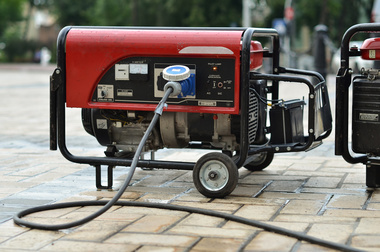Generators differ mostly in wattage, permanence, fuel source and cost. Depending on how you use it, you may be inclined toward one of three basic options.

Home standby generator
- Automatically powers your home when the power goes out.
- Rated at 5,000 to 20,000 watts.
- Costs $3,000 to $6,000 plus installation fees for an electrician.
- Fueled by propane or natural gas.
- Permanent — be sure to address any permit or noise concerns.
- Bonus features: They self-diagnose and notify you of any maintenance problems, and they will shut off if oil levels fall below the minimum level in order to protect the engine from damage.
Portable generator
- Provides power to your home or anywhere you bring it.
- Electric push-button starting.
- Rated at 3,000 to 8,000 watts.
- Costs $400 to $1,000, plus $50 for a battery if one is not included.
- Fueled by gasoline; if stored for a long period of time, it will require fuel stabilizer.
- Can be moved anywhere on your property, but it must remain 15 feet away from any structure and cannot be placed in a shed. It needs a tent or other cover for rain. The exhaust must face away from the house, as this type of generator produces carbon monoxide.
Inverter generator
- Very similar to portable generators, inverter generators can provide power to your home or anywhere else. They also have a more complex engine and exhaust system than portables ones, which means greater efficiency, fewer emissions and less noise.
- Rated at 3,000 to 8,000 watts.
- Costs $500 to $4,000.
- Fueled by gasoline.
- Portable; follow the same safety guidelines as for a portable generator.
Another cost to consider with a generator is a transfer switch, which must be installed by an electrician. It safely connects the generator to your house’s electrical panel to eliminate the risk of any fried appliances or generator damage, and it will cost about $500 to $900. A standby generator will use this to switch itself on and off when the power comes and goes, but a portable generator requires you to flip the switch manually. Get your electrician to walk you through the process upon installation so you know it. In fact, electricians and qualified dealers can be good sources of advice about what’s right for you.
To save money on the transfer switch, you could always opt for an interlock device instead. Costing $100 to $200 less, it prevents both the power and the generator from being on at the same time by regulating your electrical panel’s main cutoff switch.
Another option: No generator
The Pilgrims did it! Go old-school and turn the night into an adventure or opt for gas in order to return some of those creature comforts; a gas stove will still let you cook hot food and a gas fireplace can keep you warm on an cold winter night. (But electronic igniters for gas devices probably won’t work!)
Whatever generator you choose, be sure to get the one that is rated for the wattage you need to power the refrigerator, sump pump and other essentials. A blackout may not be the time to stream Netflix, but you can at least save your milk!
When it’s time to sell you home fast contact Buy RI Houses for a fast fair cash offer. Doesn’t matter condition or location.